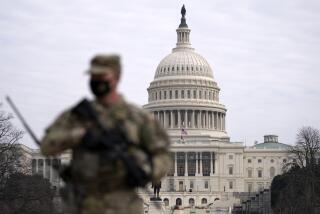Japan’s Lower House OKs New Defense Plan
- Share via
TOKYO — Japan’s lower house of parliament approved long-awaited legislation today that spells out how this nation will assist U.S military forces in case conflict breaks out in its neighborhood.
The guidelines for U.S.-Japan defense cooperation do not require Japan to change its “no war” constitution or to fight unless directly attacked. But for the first time, they do commit Japan to helping the United States preserve peace and stability in vaguely defined “areas surrounding Japan,” including performing search-and-rescue operations, resupplying U.S. troops and offering behind-the-lines logistical support.
“There is a near-consensus being formed that unconditional pacifism is not a practical policy after all,” said former diplomat Yukio Okamoto.
Though Japan’s small Communist and Socialist parties opposed the legislation, and pacifist teachers and labor unions have demonstrated in front of parliament against the bills they fear would drag Japan into an “American war,” polls indicate that up to 70% of Japanese favor the measures.
U.S. Ambassador Thomas S. Foley last week dismissed as “total nonsense” the notion that passage of the guidelines would cause Japan to lose control of its Self-Defense Forces, as some on the left here fear. But Foley also noted that the Japanese people have shown no appetite for scrapping the “self-defense only” constitution.
Debate over the details of the three defense laws was heated. In a last-minute compromise struck Sunday, the ruling Liberal Democratic Party, or LDP, agreed with two other major parties to delete a controversial provision that would have allowed Japanese naval forces to board and inspect foreign ships.
The deal gave the LDP enough votes to ensure passage in the lower house of parliament today, in time for Prime Minister Keizo Obuchi to present the package to President Clinton during their summit in Washington on Monday. The bills are expected to win final approval from the less powerful upper house of parliament next month.
The LDP promised to reintroduce separate legislation on maritime inspection--a provision Japan had promised the United States--and try to get it through parliament by the end of June.
The maritime bill is symbolic of the ongoing debate over how far Japan can go in international peacekeeping or logistical support for U.S. forces without violating its constitution, and how far it can push its nonviolent principles without angering its U.S. ally.
The dovish Komei New Party wanted to require a U.N. Security Council resolution to give Japan’s Maritime Self-Defense Forces authority to board and inspect foreign ships, for example in order to enforce economic sanctions. But the hawkish Liberal Party argued that requiring prior U.N. approval would prevent any joint U.S.-Japanese operations.
“It is nonsense to condition such Japanese naval inspections on the existence of [U.N.] Security Council resolutions because this is one place in the world where you can’t hope to have Security Council resolutions” because of opposition from Russia and especially China, Okamoto said.
“China vetoes keeping [peacekeeping] forces in Macedonia, where China has almost no strategic interest,” he said. “In this region, will China say ‘yes’ to everything the U.S. wants to do? That’s impossible.”
Though the guidelines identify no country as an adversary, Japan has grown more wary of North Korea since it fired a long-range ballistic missile over Japan last summer and then allegedly sent two spy ships deep into Japanese waters last month.
Chinese officials have made clear that they view the wording of the guidelines, which invoke a Japanese duty to respond to military emergencies in “areas surrounding Japan,” to be aimed at them. And they also view the document as a threat of Japanese military confrontation should China use force against Taiwan, which Beijing considers a renegade province.
Japan and the United States have steadfastly refused Chinese demands to specify whether Taiwan is included.
However, the opposition Liberal Party also complained that the definition was too vague. So in another compromise, the parties added that they meant, for example, “emergencies that threaten to develop into direct attacks on Japan if no preventive action is taken.”
“This is an important step forward in the alliance,” said one Western diplomat. But the diplomat also warned against “overselling it.”
U.S. security analysts have long predicted that even with the guidelines, Japan’s role would probably be deemed inadequate by the U.S. public in the event of a prolonged conflict that cost American lives, such as a war on the Korean peninsula.
The U.S. military, however, has said the guidelines will permit much-improved contingency planning and allow Americans to rely on their Japanese partners to a greater degree, even if the scope of the assistance is limited.
Even though doubts remain about the speed and extent of the Japanese reaction, Defense analyst Sumihiko Kawamura, a former Japanese naval officer, said of the change: “It’s a big step toward becoming a normal country.”
More to Read
Sign up for Essential California
The most important California stories and recommendations in your inbox every morning.
You may occasionally receive promotional content from the Los Angeles Times.













